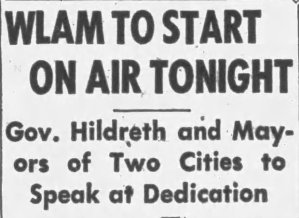
The studios and transmitter tower of WLAM radio on Washington Street in Auburn are pictured in this undated photo. The studio was demolished in 2013. (Courtesy photo)
WLAM AM 1470 in Lewiston-Auburn, once a popular home for zippy jingles, hyped-up DJs, music, sports and news, signed off Aug. 14, ending almost eight decades on the air.
The station, which went live Sept. 4, 1947, had many formats and owners over the years.

A headline in the Sun Journal from Sept. 4, 1947, announces the start of WLAM AM radio in Lewiston-Auburn. After 78 years, the radio station signed off Aug. 14. (Sun Journal via Newspapers.com)
The latest was Bob Bittner, who bought WLAM and WLVP in Gorham/Portland in February 2016. Bittner died May 26, 2023, and his estate continued to fund the station, with engineer Bob Perry keeping it on the air.
On Aug. 11, Perry announced that WLAM would go dark, citing the high cost of power and utilities. The station is for sale.
Bittner at one point owned and operated six radio stations in Maine and Massachusetts. All were commercial free, supported by listener donations and automated with Bittner’s signature sounds — music from the 1940s through the ’80s — that he dubbed “The Memories Stations.”
(Devotees of Bittner’s Memory Stations can still listen to the sounds he created, commercial-free, at bobsmemorystation.com/.)
When Bittner bought the stations, he automated everything so it ran from a computer at the transmitter rather than from a studio.

Bob Bittner, pictured in 2015, bought WLAM radio in 2016 and ran a total of six radio stations in Maine and Massachusetts until his death in 2023. (Gordon Chibroski/Staff Photographer)
AM radio was dominant for many years and is credited with revolutionizing how Americans got both their information and entertainment. The live broadcasts of sporting events, music and even President Franklin D. Roosevelt’s famous fireside chats in the 1930s and ’40s found families gathering around the radio to listen in.
The advent of FM radio and then the rise of television started the decline of AM radio’s popularity, with the exception of powerhouse frequencies in major cities. Some electric vehicle makers have eliminated AM radio in their cars because the electric engines interfere with the AM signal.

Call letters for radio station WLAM are seen at 129 Lisbon St. in Lewiston, where the station had its original studios. (Courtesy photo)
WLAM had a long history in Lewiston and Auburn. Its first studios were at 129 Lisbon St. in downtown Lewiston, taking up the top two floors. On its first day on air, Lewiston’s mayor at the time, Louis-Philippe Gagné, welcomed the radio station to the community in a speech.
“Again, Lewiston and Auburn are on the march on the road of progress,” he wrote. “On behalf of the citizens of Lewiston, I am very glad to extend the most cordial welcome to this new station WLAM, which is a splendid addition to the business, commercial, educational and musical life of our community.”
In the station’s early days of the 1950s and ’60s, sports and personalities were big. There was Fred Haggerty with his “Alarm Clock Club,” and “The Teenage Coke Party” sponsored by Peck’s Department store. “Junior Town Meeting” was a popular program for many years containing debate and discussions of issues among students from Lewiston and Auburn high schools, moderated by an Edward Little High School teacher.
There was play-by-play coverage on “Pepsi’s Football Game of the Week,” and even live harness racing from Lewiston Raceway, which ended operations in 1990.
WLAM changed call letters and owners a number of times, becoming WKZN in 1990, WZOU in 1993 and back to WLAM in 2001. The station broadcasted all news content for a while, then ESPN radio in 2005. The station was purchased at a bankruptcy auction in 2012 and then sold again in 2016 to Bittner’s Blue Jey Broadcasting.
Ron Frizzell was one of WLAM’s owners from 1975 to 2000.
“We were exceptionally active in the community when other stations were kind of just going away,” he said Thursday.
“We came in and restored WLAM to the glory it had,” Frizzell said, referring to the tremendous visibility and popularity the radio station had in the 1950s and ’60s.
“It was a huge station in the community,” he said, adding that it was Frank Hoy, a former general manager and editor at the Sun Journal, who bought WLAM in the 1950s and increased its prominence.
Coincidentally, Hoy was fired from the newspaper by owner Louis Costello for not getting his permission to buy the radio station.

We invite you to add your comments. We encourage a thoughtful exchange of ideas and information on this website. By joining the conversation, you are agreeing to our commenting policy and terms of use. More information is found on our FAQs. You can modify your screen name here.
Comments are managed by our staff during regular business hours Monday through Friday as well as limited hours on Saturday and Sunday. Comments held for moderation outside of those hours may take longer to approve.
Join the Conversation
Please sign into your Sun Journal account to participate in conversations below. If you do not have an account, you can register or subscribe. Questions? Please see our FAQs.